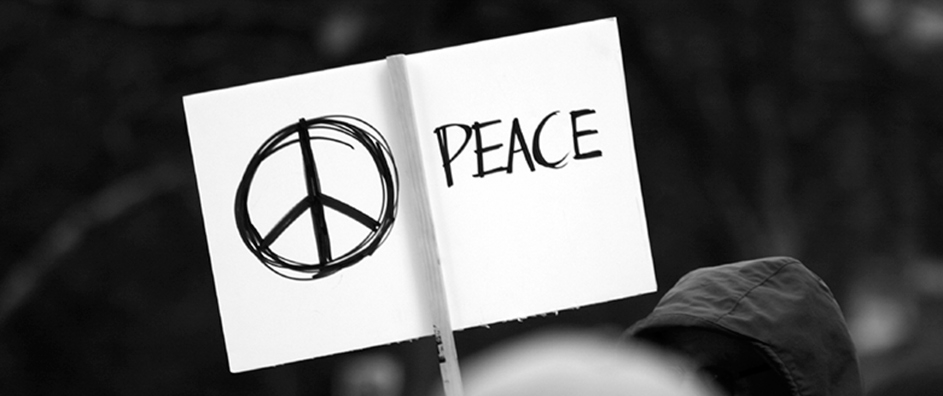The views expressed in our content reflect individual perspectives and do not represent the authoritative views of the Baha'i Faith.
Come and cast down your weapons of wrath, till unity is won! Come and in the Lord’s true path each one help each one. – Abdu’l-Baha, Selections from the Writings of Abdu’l-Baha, p. 273.
A great deal of hype exists in the media about gun control, refugees, and politics. We criticize, lampoon and poke fun at political candidates for their positions on those issues, argue about whether refugees are bad or good, and disagree endlessly about guns. People expound their viewpoints—often to the detriment of relationships—to ensure that we hear their voices.
In America, we especially hear a wide range of opinions: some profess that destroying all guns and demanding stricter laws will solve the problem; some say that prayer is the fix that we all need; some don’t even want to get involved in the argument; and still others stand behind the rights that were written back in 1787 on a (frequently amended) document, at a time when slavery was legal and women had few rights. Who is right? Is anyone right?
Let’s imagine for a moment that we could remove all of the weapons in the world. If it were possible to collect and destroy every weapon and every bomb, and prevent any future weapons production, would that stop the crime or the warfare that exists in the world? Consider this statement from the Universal House of Justice, the international governing body of the Baha’i Faith:
Banning nuclear weapons, prohibiting the use of poison gases, or outlawing germ warfare will not remove the root causes of war. However important such practical measures obviously are as elements of the peace process, they are in themselves too superficial to exert enduring influence. Peoples are ingenious enough to invent yet other forms of warfare, and to use food, raw materials, finance, industrial power, ideology, and terrorism to subvert one another in an endless quest for supremacy and dominion. Nor can the present massive dislocation in the affairs of humanity be resolved through the settlement of specific conflicts or disagreements among nations. A genuine universal framework must be adopted. – The Promise of Universal Peace, October 1985.
This quote seems to tell us that while arms control remains an important piece of the process toward world peace; it doesn’t address the underlying root causes of war.
So maybe we shouldn’t focus on right or wrong opinions—maybe we should work collaboratively to bring about world peace. Does arguing about our opinions bring us together? Definitely not! It only focuses on our differences, instead of focusing on our commonalities—such as the essential unity of our shared humanity.
Call me an idealist, but I believe that the Baha’i Faith has answers for dealing with the issues we face today. The Baha’i writings steer us away from contention and disagreements. The basic tenets of the Baha’i Faith hinge upon building peace through loving our fellow humans, achieving universal education, promoting global communication through the use of a universal language, striving for the equality of men and women, and solving economic difficulties through spiritual means.
In addition to building our lives upon these universal beliefs, the Baha’i writings also provide practical guidance on ways to bring about world peace. Abdu’l-Baha discusses a powerful yet simple method for changing our mindsets, which in turn has ripple effects in the world, in the following quote from Paris Talks:
I charge you all that each one of you concentrate all the thoughts of your heart on love and unity. When a thought of war comes, oppose it by a stronger thought of peace. A thought of hatred must be destroyed by a more powerful thought of love. Thoughts of war bring destruction to all harmony, well-being, restfulness and content. Thoughts of love are constructive of brotherhood, peace, friendship, and happiness. – p. 29.
Other practical guidance for building world peace hinges upon our behaviors, and the Baha’i writings have much to say about deeds and actions. In the Hidden Words, for example, Baha’u’llah says, “Say: O brethren! Let deeds, not words, be your adorning.” Baha’is believe putting our beliefs into action can transform ideals into reality:
The wrong in the world continues to exist just because people talk only of their ideals, and do not strive to put them into practice. If actions took the place of words, the world’s misery would very soon be changed into comfort. – Ibid., p. 16.
In sum, what can each of us do to improve the problems of the world today? How can we bring about world peace? We can love each other more, and argue less. We can support equal rights and education for every human being. We can eliminate the “root causes of war” by focusing on those things we can each control—our individual thoughts, beliefs, and actions.
















Comments
Sign in or create an account
Continue with Googleor